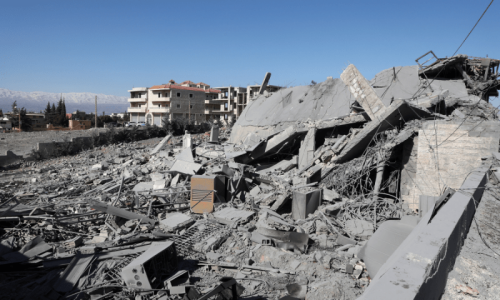
DOHA: The head of Israeli intelligence is expected to lead ceasefire talks with mediators which resume in Qatar today (Sunday) in direct response to a new proposal from Hamas, a source close to the talks said on Saturday.
The talks between Mossad head David Barnea, Qatar’s prime minister and Egyptian officials will focus on remaining gaps between Israel and Hamas including over prisoner releases and humanitarian aid, the source said.
Israel had said on Friday it would be sending a delegation to Doha, but did not spell out when it would do so or who would take part. Prime Minister Benjamin Netanyahu was expected to convene the security cabinet before the talks.
Israeli officials were not immediately available to comment on Saturday, the Jewish Sabbath.
Negotiations to focus on prisoners’ release and humanitarian aid; deadly Gaza strike kills 36; Hamas, Houthis hold rare meeting
Barnea was involved in previous significant pushes for a deal. A short-lived truce in November was agreed and came into effect after his participation in talks in Doha. His last meeting with Qatar’s prime minister in January led to a proposal for a temporary ceasefire that Hamas ultimately rejected.
Hamas this week presented a new ceasefire proposal to mediators and Israel’s ally, the United States, that includes the release of Israeli prisoners in exchange for freedom for Palestinian prisoners.
Repeated efforts to agree a ceasefire and exchange hostages for prisoners have fallen apart this year, despite mounting international pressure over the human cost of Israel’s ground and air assault in Gaza.
Israel’s military campaign has killed more than 31,500 Palestinians, about 70 per cent of them women and children, according to the health ministry in Hamas-run Gaza.
Gaza strike
Displaced by Israeli bombardment, the Tabatibi family gathered in central Gaza to eat together, a scene that soon turned into a bloodbath.
An air strike hit the building where they were staying as women prepared the pre-fasting meal, killing 36 members of the family, survivors said on Saturday.
The health ministry in Hamas-run Gaza, which provided the same death toll, blamed Israel for the strike in Nuseirat, while the Israeli military said it was looking into the incident.
The strike in Nuseirat was one of 60 “deadly air strikes” reported overnight by the press office of the Hamas-run government, from Gaza City in the north to Rafah in the south.
“This is a bloody night, a very bloody night,” said Salama Maarouf of the Hamas-run government media office.
Hamas, Houthis meeting
Meanwhile, senior figures from Hamas and Yemen’s Houthis held a rare meeting to discuss coordinating their actions against Israel, Palestinian factional sources said on Friday.
According to sources from Hamas and Islamic Jihad, leaders from the two Palestinian groups, as well as the Marxist Popular Front for the Liberation of Palestine, held an “important meeting” with Houthi representatives last week.
The groups discussed “mechanisms to coordinate their actions of resistance” for the “next stage” of the war in Gaza, the sources said without identifying where the meeting took place.
The Palestinian groups and the Houthis also talked about a possible Israeli ground assault into southern Gaza’s Rafah, said the sources, who requested anonymity.
The Houthis confirmed they would continue their attacks on Red Sea shipping to “support the Palestinian resistance”, according to the sources.
Published in Dawn, March 17th, 2024














































